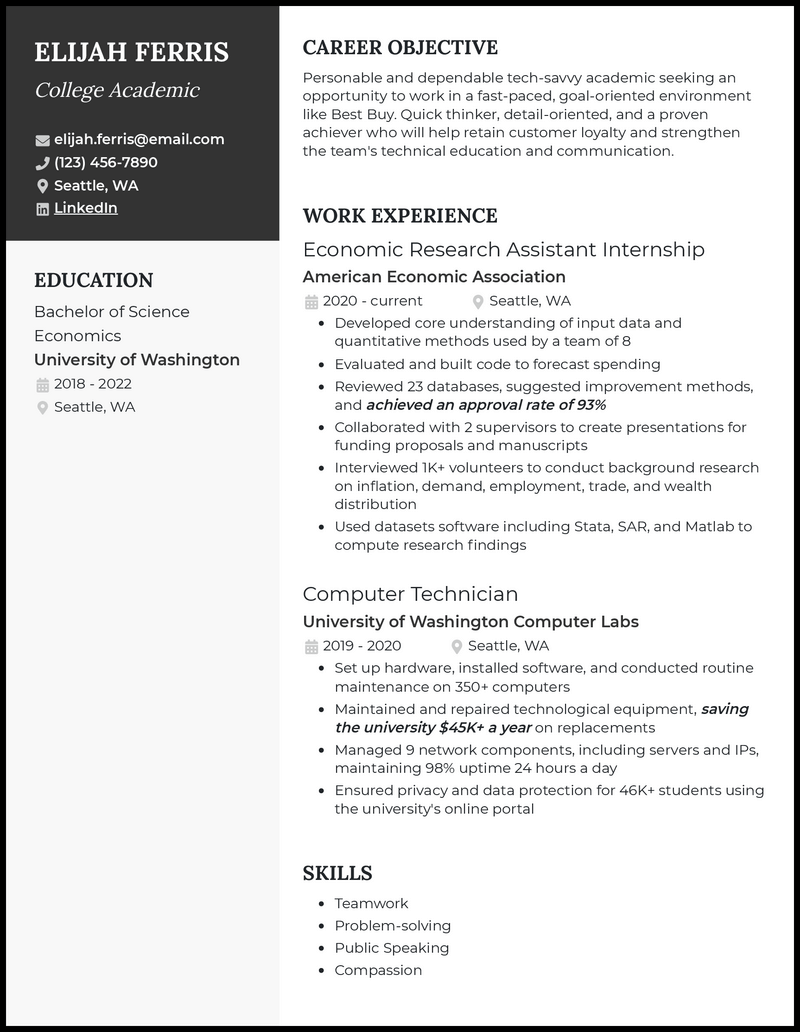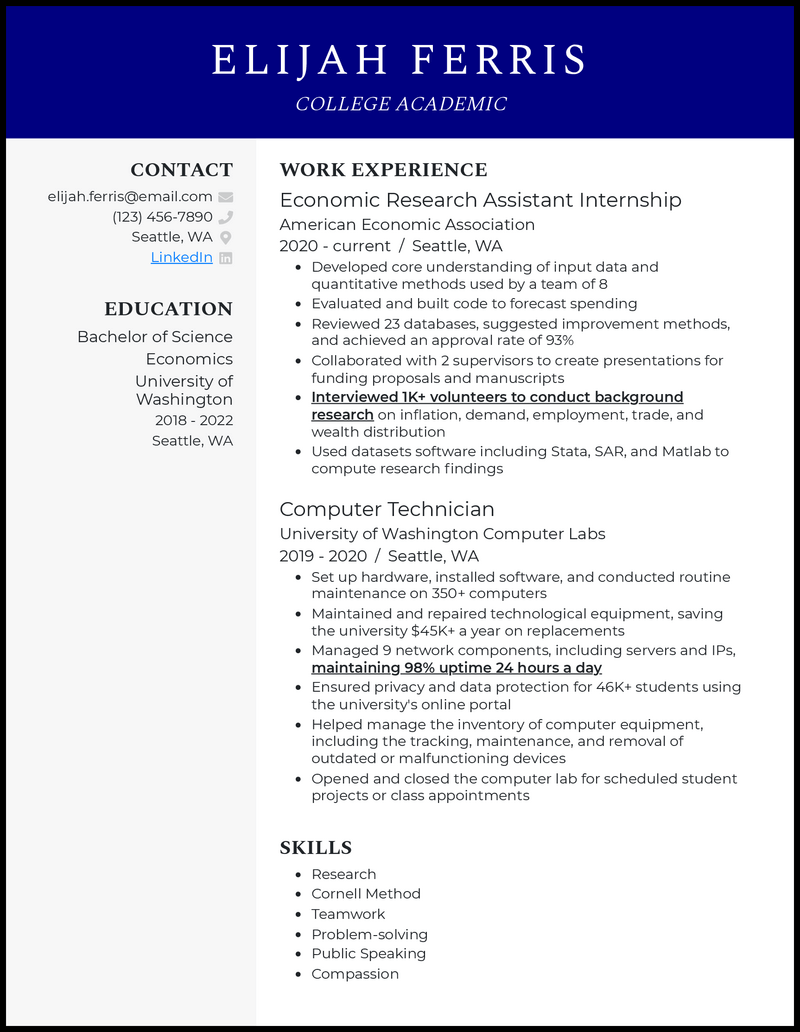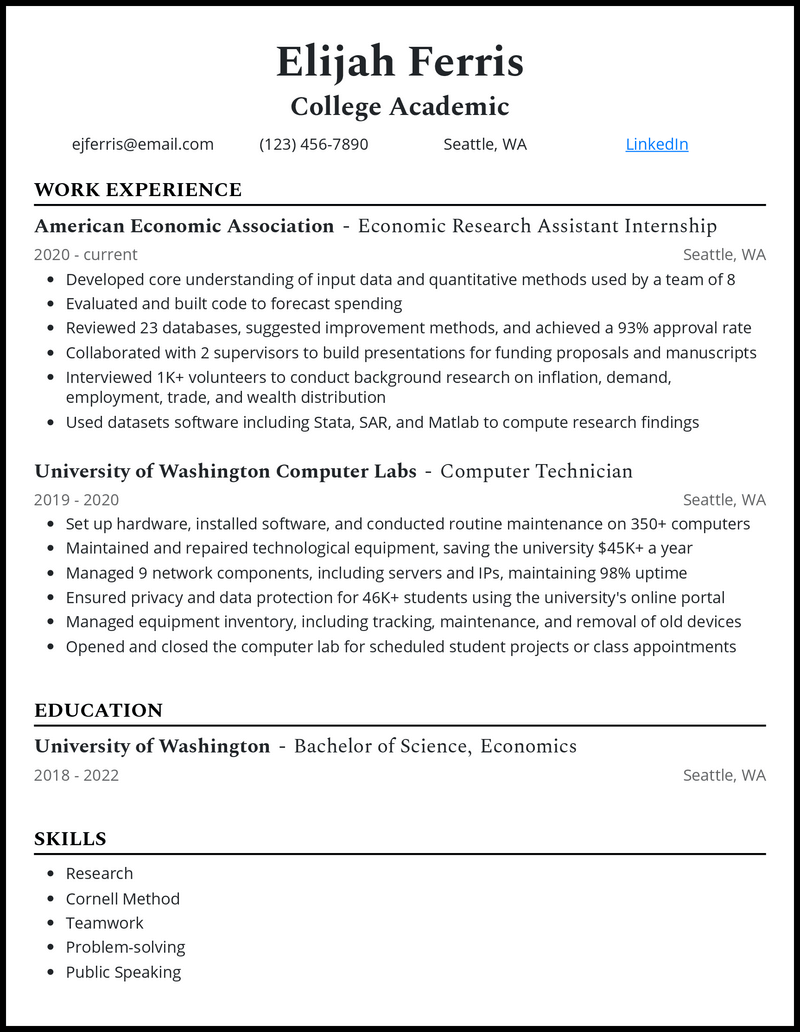As a college academic, you’ve become a pro at research projects, report writing, and data collection—not to mention a subject matter expert in your field.
While your academic skills are honed, it’s easy to feel daunted by the idea of writing a cover letter or an effective resume with limited work experience and little professionally published work.
Our resume templates are here to help. With these College Academic resume examples and resume tips, you’ll know exactly what to include to demonstrate your academic achievement and value.
Related resume examples
What Matters Most: Your Academic Skills & Experience

Right now, you’re an aspiring academic with a bachelor’s degree, still at the beginning of your career.
That means “the basics” are still pretty important and hiring managers will expect you to demonstrate strong foundations in skills like academic writing, research, and project management. Don’t be afraid to include these skills on your resume and expand on or back up your claims in the work experience section.
There will also be technical skills, tools, and software you can include that are specific to your area of study. As an example, a computer science student should list some programming-specific tools.
9 most popular college academic skills
- Research Design
- Data Fluency
- Academic Writing
- Microsoft Office
- EndNote
- Tableau
- Python
- C++
- AWS
Sample college academic work experience bullet points
Knowing what to put on your work experience can be the hardest part of resume writing for budding academics. This is because it can feel like nothing you’ve done so far is close to the level of what you want to do next.
However, it’s important not to worry too much—at this stage in your career, all experience is good experience. Just focus on the valuable and relevant skills you leveraged to achieve results during your internships, research projects, and school work.
To really catch the eye of those reading your resume, make sure to include as many metrics as you can. Tangible results are what resonate with recruiters and hiring managers the most.
Here are a few examples of how to utilize metrics when you build a resume online:
- Collaborated with a team of 3 researchers to design and execute a study involving a sample size of 450 participants, achieving a 96% response rate
- Presented research findings at an international conference, delivering a speech to more than 250 professionals and receiving invitations for publication opportunities
- Led a student organization focused on promoting diversity in academia, organizing events that led to a 20% increase in membership
- Served as a teaching assistant for a course with an enrollment of 65 students and led weekly discussion events, helping to improve course evaluations compared to the previous year
Top 5 Tips for Your College Academic Resume
- Tailor your applications
- Make sure to read the job description carefully and update your resume with information that’s more relevant to the specific position. Even small changes like focusing on research skills for a research position can help.
- Talk about your education
- As an academic, your education is pretty important. Don’t be afraid to list specific courses you took that are relevant to the position, just add them under your major.
- Don’t shy away from your achievements
- Whether it’s your GPA, your published work, or your research results, feel free to mention the achievements you’re proud of. They’ll eventually become less relevant as the years go by and you achieve more and more, so brag about them now while you can.
- Be picky
- If you’ve worked through college, you may have some jobs to include in your resume even if they’re not related to academia. However, pick and choose your achievements and tasks so that there’s a lot of overlap with the job you’re applying for. For example, if you worked in customer service, mention things related to collaboration and data.
- Get detailed
- Research is a big part of life as an academic, so don’t be afraid to go into detail about the projects you worked on and the specific methodologies you employed. It gives the reader a lot more detail about your skills and experience in the area.
If you’re proud of your GPA, you can go ahead and list it alongside your education. On the flip side, recruiters shouldn’t discard your resume just because your GPA isn’t listed.
If you’re applying to an academic role, there’s no need to include unrelated work experience. However, if you’re having a hard time filling out your resume, it won’t hurt to mention part-time work.
There’s really not enough room to include references on your resume. However, if you know you’re likely to be asked for them, you can include a “references on request” note at the bottom of the page to show you have them ready to send.








